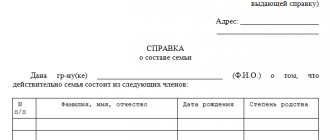Grounds of inheritance: what is it?
Even in Roman Law, the grounds for the legal rights to accept the property of the deceased were defined: will and law. Now the same is indicated by Article 1111 of the Civil Code. The basis for inheritance under a will is the will of the owner, who, during his lifetime, outlined how the acquired assets should be disposed of after his death.
In contrast, the basis for inheritance by law is the degree of relationship. There is a sequence according to which the heirs accept the right to receive the inheritance. There is also a preferential category of citizens who have the right to a mandatory share. The will has priority. The lifetime expression of will is the leading one in the distribution of the hereditary mass. If there is no will, the inheritance is distributed according to the law.
In legal practice, there are often cases when the registration procedure assumes the existence of grounds for two types of inheritance. For example, a will determines the transfer of part of the inheritance. Then the remainder is distributed according to the law among the first-priority relatives. The successor under the will has grounds to receive the due share, and relatives have grounds to claim the rest of the property of the deceased. Now, in order to better understand, it is necessary to delve into the topic and consider in detail each method of inheritance.
What are the grounds of inheritance
The basis of inheritance is understood as the primary reason for the transfer of the property rights of the deceased to specific recipients after the death of the owner.
The procedure for transferring rights to the property of the deceased is provided for on 2 grounds (Article 1111 of the Civil Code of the Russian Federation):
- in law;
- by will.
However, the grounds do not have legal force in themselves. For the grounds of inheritance to come into force, it is necessary:
- establish the fact of death;
- obtain a death certificate;
- open inheritance.
Property owned by the deceased at the time of death passes to his heirs. The process of accepting property is called inheritance.
A prerequisite for transferring objects by inheritance is the existence of ownership rights. The Civil Code does not provide for the possibility of inheritance for objects that a citizen used under a lease agreement for gratuitous use.
In addition to the rights, the responsibilities of the deceased are also transferred to the heirs. These include all debt obligations of a citizen that are not related to his personality.
The rights and obligations of the deceased owner can be transferred exclusively as follows:
- as a whole (inseparably);
- completely, but not exceeding the amount of property of the deceased.
Type of inheritance
With the development of society, an inheritance system was built that provided for the interests of all categories of legal successors. The situation can be seen using the following example. There lives a man who decides for himself who should get what. He draws up a will and thereby gives instructions to the executor, whose mission is now performed by the notary. If the owner does not have such a need, the property remains in the family.
Now the inheritance is distributed among the remaining living relatives. The applicants are everyone who was related by blood and spouses. There are cases when the testator decided to transfer part of the valuables to a specific person, assuming that the rest would be distributed among the heirs on the basis of kinship. This will is also carried out strictly. The successor under the will receives what is prescribed by the document, the remainder goes to the relatives. This inheritance scheme fully reflects the will of the owner.
By will
The written expression of will is a strict guide for execution after the death of the testator. The document is the main basis for entering into the inheritance of the person specified in the text. The legal successor can be a relative, a third party, an organization, or the state. Disagreeing applicants can challenge the document if gross errors were made during its execution or if a crime was identified in the procedure. Otherwise, the legal heirs will not be able to do anything except come to terms with the situation.
The law says that any amount can be bequeathed. Property is transferred in whole or in part to one or more applicants. The expression of will is voluntary, which is a mandatory requirement. The paper is notarized, and the contents are kept secret until the day of disclosure, which coincides with the date of death of the testator. An incapacitated citizen does not have the right to sign on legal documents, so he cannot draw up a will. Violation of this rule is sufficient grounds for declaring the document invalid.
But there is a category of persons who, in any case, have the right to claim an obligatory share, even if there is not a word about them in the text. These are people in need of social protection, and when the testator dies, the state obliges them to provide them with the obligatory property left after him. This refers to subjects who do not have the opportunity to earn money. Thus, minor children born in marriage and out of wedlock have the right to receive a share equal to that which would be due if they were the primary heirs.
The incapacity of the dependents cared for by the testator indicates the emergence of the right to express claims to an obligatory share. The grounds arise for persons who were dependent on the testator during the last year of life.
The grounds for inheritance by will are not dominant if there are obligatory heirs. The sequence is:
- Dependents and minors receive the inheritance first;
- then the will comes into force;
- then the remaining inheritance is divided among relatives.
In law
The basis for inheritance is the presence of family ties. But not every family member will receive a share of the deceased's property. To streamline the procedure and make the distribution of property fair and understandable, the degree of relationship is taken as a basis. There are seven lines of inheritance. Leading grounds are available to the first-priority successors, which include children, parents, and spouse. Husbands and wives who are former at the time of disclosure of the inheritance do not apply to them.
The number of persons who may be called upon to accept an inheritance includes the children of the deceased, and under the rights of compulsory inheritance. The same grounds apply to disabled dependents. These could be elderly retired parents or third parties. If there are no representatives of the first line, or they refused their share, the heirs of the second, then the third, and so on until the seventh line have grounds.
There is a basis for accepting property values in fact. This means that the inheritance mass or part of it goes to the person who lived with the testator before his death, used the property, and spent money on maintenance, care, and repairs. However, it is not necessary to submit an application to a notary. There is also no need to go to court. It is enough to contact the local government authorities and obtain a certificate of inheritance. In any case, the procedure is completed after the inheritance is re-registered in one’s name.
Basic principles and features of inheritance by law
Inheritance by law is often the main basis for inheritance in the Russian Federation. Its meaning, place, time, features of its occurrence, discovery and other important provisions are also contained in the Civil Code of the Russian Federation. At the same time, the main basis for the right of legal inheritance and opening of inheritance under the legislation of the Russian Federation is the fact of consanguinity.
The general provisions provided for by the Civil Code of the Russian Federation establish eight lines of legal heirs.
The heirs of the first stage are the children, spouses and parents of the deceased testator. Then the circle of heirs expands; it may include the testator’s grandparents, etc. If the applicants for the inheritance have insurmountable differences, the procedure for eliminating them will take place in court. In this case, the place of the trial will depend on the place where the inheritance was opened.
The special composition of heirs by law includes persons who, by the day the inheritance was opened, had been dependent on the testator for at least one year. In this case, they will have a full right to claim the opened inheritance on an equal basis with the line of heirs by law who are called for inheritance. The judicial procedure for resolving inheritance disputes related to disabled citizens and dependents is also regulated by the Civil Code of the Russian Federation and the Civil Procedure Code of the Russian Federation. In this case, the procedure for opening an inheritance, as well as its composition, place and time will be determined on a general basis.
When does inheritance by law apply?
The main grounds for this type of inheritance include kinship and legal capacity. According to the law of inheritance, there is a reason that cancels the first condition, making it insufficient if the first relative does not fall within the circle of obligatory ones. This is a will. This obstacle can be forced if the successor:
- Refused inheritance.
- Found unworthy.
- I signed over the share voluntarily.
- Forced the testator to do this.
The death of a legal successor cannot be a sufficient reason, since his heirs are not always relatives of the deceased. In this case, his heirs already claim the property according to the law. In other cases, the inheritance is distributed among blood relatives.
Reasons
The procedure and basic provisions of inheritance, according to the legislative framework of the Russian Federation, states that the grounds for legal inheritance are situations when:
- There is no properly executed will.
- The expression of will was declared void and lost legal force.
- The state gives the successor a mandatory share.
- A voluntary renunciation of bequeathed property in favor of relatives has been formalized.
- Failure to accept an inheritance under a will within six months.
In this case, there is a reason to receive a share equal to that assigned to the applicant from the same line of inheritance.
Grounds for inheritance by law
Some citizens do not leave an administrative document regarding the fate of their property during their lifetime. In this case, the transfer of rights occurs in accordance with the norms of current legislation.
The grounds for inheritance by law are the following circumstances:
- there is no will;
- the document is declared void or invalid due to the fact that there was a violation of the form or procedure for its preparation;
- compulsory share of inherited property for dependents and minor citizens who are in the care of the deceased testator;
- the death of the heirs before the death of the testator or at the same time with him. It is assumed that all recipients will renounce the inherited property. Sometimes it happens that none of the heirs accepted the inherited property under the will;
- during the process of testamentary refusal on the part of the heirs.
The definition and main principles of inheritance carried out by law are regulated by a separate chapter of the Civil Code. The inheritance process is carried out in the established order of the heirs, which is not changed by the testamentary document of the deceased testator. What are the grounds for inheritance? This issue is discussed in Chapter 63 of the Civil Code of the Russian Federation.
Legal heirs: rules
Only those persons directly specified in the law can be considered heirs. When there are no heirs of the 1st stage at all, then there is only one option - calling on the heirs of the 2nd stage. Hereditary succession establishes the grounds of inheritance for 8 queues of such categories of persons.
Heirs who belong to the same line receive the entire inheritance in the same amount. But the heirs - applicants, by right of representation, distribute the share of the direct heir in half.
Inheritance by will: features and procedure
Inheritance based on a will is one of the legal ways of transferring property values after death. The successor can be any entity, including organizations and government agencies. The testator draws up a unilateral agreement. The signed agreement is notarized, read out in front of witnesses and packed in an envelope. All participants in the transaction, including the notary, are required to keep the contents of the document secret until disclosure.
The fact of discovery presupposes the involvement of the person specified in the text to announce the conditions. According to the norms of Civil Law, property passes to the heir after six months. During this period, the subject of the agreement is identified, compulsory heirs are sought, and measures are taken to search for and form the inherited mass. An inheritance case opened on the day of the death of the testator ends with the issuance of a certificate of inheritance, which provides grounds for re-registering the property to a new owner.
Testator's capacity
A finding of incapacity is the basis for canceling the expression of will so that inheritance is carried out according to the law. By legal capacity it is necessary to understand that the person drawing up a legal document:
- Is an adult.
- Gives a report on what is happening.
- Able to think adequately.
A number of diseases have been identified that do not allow this to be done. Reaching the age of majority is a mandatory basis for inheritance.
Features of expression of will
The object of the transaction may be:
- apartment, house;
- dacha, garden, vegetable garden;
- garage, parking space;
- personal belongings;
- jewelry;
- cash and deposits;
- shares and other securities;
- any property.
A subject of any category is chosen as a successor: an individual, a legal entity, or a state.
When registering, the participation of a notary is required. A severe form of illness that physically prevents you from coming to the office is the basis for non-notarial registration. Witnesses and the head physician of the hospital are involved if the person is inpatient treatment. It is possible to draw up several wills. Wherein:
- The latter cancels the previous ones completely if the same property is indicated.
- Documents work in parallel, with a separate item being transferred for each of them.
- The papers partially overlap in content. The case is complex, and in most cases the decision is up to the court.
The peculiarity of this type of transaction is that rights arise on the basis of the strong-willed decision of one participant.
Personal transaction
According to current laws, a testamentary agreement is a personal transaction and allows execution without an heir. The authenticity is indicated by the signature and seal of the notary. His assurance is the basis for believing that the inheritance:
- It happened without coercion.
- Voluntary.
- Issued by a legally competent person.
Age does not matter if the person drawing up the will is over 18 years old.
Unilateral agreement
The fact that the successor may not know that he is entitled to an inheritance is the basis for using laws when deciding to assume rights. Inheritance is a voluntary procedure. The heir can accept the property, transfer it to someone else, or refuse it completely. This is advisable if the debts of the testator are transferred along with the valuables, which is also provided for by current legislation.
Base
Only property that the testator personally owns is transferred. Another reason that has already been mentioned is adulthood. If incapacity is revealed, the testamentary document is declared invalid. This is also done in other cases established by law. For example, if the successor is unworthy.
Entry into inheritance under a will
What are the grounds for inheritance by law? Every citizen, by law, has the right during his lifetime to determine the circle of his successors, to whom the rights of the testator will pass after his death. Article 1119 of the Civil Code of the Russian Federation indicates that any person, even those without family ties with the testator, can become an heir under a will.
A will is the indisputable will of the applicant. The document is drawn up in a notary's office by the testator personally. The testator is not obliged to indicate the reasons for making a certain decision, nor to disclose his heirs. The text of the document may indicate:
- List of recipients of property after the death of the testator.
- List of those who will be deprived of the right to join (unworthy heirs).
- Conditions for accepting property and the executor of the will of the testator.
By will, you can select one or more heirs, indicating the shares of each. If the parts of the property for each are not determined by the testator himself, then the left property will be equally divided between all applicants.
One of the features of inheritance by will is the presence of persons who may not be indicated in the document, but will still receive a share in the inheritance. The obligatory share is half of what could go to such a recipient by law. The following may enter into inheritance according to the law in the presence of a will:
- Minors and disabled children of the testator.
- Parents of the deceased who are unable to work due to disability or old age.
- The surviving spouse who is disabled.
When a spouse enters into inheritance, the husband/wife can receive half of the property left behind if it is recognized as jointly acquired, and also take part in the division of the other half.
Testator's rights
What rights does the testator have:
- Transfer property by inheritance to any entity.
- Divide property into parts.
- Include any valuables in the inheritance mass.
- Assign shares to successors in the inheritance procedure.
- Deprive inheritance rights without specifying reasons.
- Cancel and change the terms of the transaction.
- Demand compensation in case of early disclosure.
- Appoint a secondary successor in the event of the death of the primary one.
- Transfer the right to sign in the presence of a notary if it is physically impossible to do it yourself.
- Entrust the execution of inheritance to an executor (third party).
- Determine the obligations of the successor (refusal, non-fulfillment - grounds for deprivation).
- Required to take care of pets.
A full list of rights and obligations in testamentary inheritance is stipulated in the Civil Code of the Russian Federation.
Article 1111 of the Civil Code of the Russian Federation. Grounds for inheritance (current version)
The commented article talks about the grounds of inheritance. Russian inheritance law divides the concept of “grounds of inheritance” into two types: inheritance by will and inheritance by law. In both cases, the heir must confirm his right to receive the inheritance.
In accordance with the commented article, inheritance by law takes place in cases when and insofar as it is not changed by a will, as well as in other cases established by the Civil Code.
It is obvious that inheritance by law is subordinate to inheritance by will, although in practice inheritance by law is more common. In cases where the testator has clearly expressed his will by disposing of his property in the event of his death, inheritance should occur in accordance with his will, and not according to the rules established by the state. This principle, characteristic of previously existing legislation in the field of inheritance law, was further developed in Part 3 of the Civil Code.
Inheritance by law takes place when and where:
a) the testator did not make a will (or the will was declared completely invalid by the court);
b) the testator bequeathed only part of the inheritance or the will in a certain part was declared invalid. Then the part of the inheritance not covered by the will, as well as that part of the property in respect of which the testamentary disposition turned out to be invalid, is transferred by law;
c) the heir under the will died before the testator or if the heir under the will - a legal entity - was liquidated;
d) the heir under the will refused the inheritance or did not accept it;
e) the heir under the will was found unworthy.
For inheritance, both by law and by will, a set of certain legal facts (legal composition) provided for by law is required. Thus, for inheritance by law, it is necessary that the person called for inheritance be included in the circle of heirs by law, that the inheritance should be opened, and that the heirs agree to accept the inheritance. To inherit by will, it is necessary to have a properly executed will, the opening of an inheritance, and the consent of the heirs to accept the inheritance. It should be noted that in a will, the testator can deprive all heirs of the right of inheritance by law and at the same time not bequeath his property to any other persons.
The legislation (Article 1151 of the Civil Code, see the commentary to it) distinguishes as a separate type such type of inheritance as inheritance of escheated property. We are talking about the inheritance of property by the state, a subject of the Federation, state and municipal entities in cases where there are no heirs either by law or by will.
Comment source:
“ARTICLE-BY-ARTICLE COMMENTARY TO PART THREE OF THE CIVIL CODE OF THE RUSSIAN FEDERATION”
S.P. Grishaev, 2018
The fact of opening a will
The inheritance case is initiated at the request of the applicant. The basis for inheritance is a handwritten application submitted to a notary office. The package is printed and the conditions are announced. The notary carries out legal monitoring, checking the accuracy of the information, the correctness of the documentation and the presence of sufficient grounds for acceptance. The result is the issuance of a certificate on the basis of which the heir re-registers the property.
Terms of inheritance
The general period of inheritance is six months after disclosure. The reference date is:
- The day of the decedent's death as indicated on the death certificate.
- The moment of issuance of the certificate of recognition as dead, if the fact was established by the court.
- The date indicated in the judicial act declaring him dead, if it is actually impossible to establish it.
When there are no other applicants, the time frame is reduced to three months. Delay in completing the case is grounds for filing an appropriate claim to restore the right of inheritance. This situation is exceptional. The judge assigns additional time for inheritance - 3 or 6 calendar months. They are added to the main six.
Entry into inheritance according to law
The grounds for inheritance by law are the presence of certain family ties with the deceased. Inheritance law depends on them. The main recipients of property are the parents, children and spouses of the testator. The specified category of recipients is first priority recipients.
It is they who, on the basis of the Civil Code of the Russian Federation (Article 1142), have the priority right to receive the property of their closest relative. If there are first-line successors, none of the other applicants have the right to inherit, with the exception of persons with a compulsory share.
In total, there are eight circles of successors, rights between which can be transferred if the heirs of the previous order:
- They refused to join.
- Recognized by the court as unworthy recipients.
- They did not show interest in the property and their rights within the allotted period.
- Died before the emergence of inheritance rights.
If there are no primary heirs, then the right to inherit is transferred to the brothers and sisters of the deceased, as well as to his grandparents (Article 1143 of the Civil Code of the Russian Federation). The third line is the uncles and aunts of the deceased.
Next, a lower priority circle of recipients is established, to whom the inheritance right is transferred in the absence of the previous generation of relatives. The last to apply for entry by law are official, but not relatives: stepmother, stepfather, stepdaughter and stepson.







